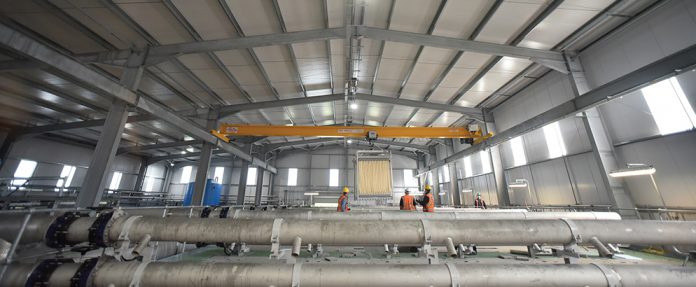Anglian Water completes largest water filtration system in Europe following a
multi-million-pound investment for Norwich’s drinking water.
Anglian Water – the country’s largest water company by geographical area – recently marked the official opening of its new state-of-the-art filtration system at its Water Treatment Works in Norwich.
The £36million project is the largest of its kind in Europe and has been specifically designed to keep customers’ taps running for decades to come, while protecting the local environment around the River Wensum, which is a designated Site of Special Scientific Interest and Special Area of Conservation.
Work on the project began in 2017 and has taken just over two years to complete, with the new system put into service at the end of 2019. The site was officially opened by Chloe Smith, MP for Norwich North, and children from the local primary school, Wensum Junior.
Super filtration
Every single day Anglian Water supplies millions of litres of water from the River Wensum to over a quarter of million customers and businesses that rely on it in and around Norwich. The new works can treat up to 57 million litres of water a day – that’s 668 litres per second.
The new filtration system contains over seven and a half million fibres, covering a total surface area of 92,000m2 – the equivalent of nine football pitches. The fibres work by removing excess sediment in the water before further treatment and ultimately ending up at customer taps.
Environmental Protection
Historically, the Costessey Pits, a bankside storage area next to the River Wensum approximately 7km away from the water treatment works, have long played an important part of the water treatment process for Norwich, providing natural storage prior to treatment.
The pits allow for solids and sediment naturally occurring in the river to settle out from the water before it’s pumped to the company’s water treatment works at Heigham for further treatment. This provides a more favourable water quality as well as providing a buffering capacity to manage sudden water quality changes in the river, before it is even treated and put into the network.
The Costessey Pits area has a rich and diverse environment that needs protecting. In the future, Anglian will not be able take enough water from Taverham alone to support the needs of the growing population without risking a detrimental impact on the environment.
To protect the environment against this, water will need to be taken further downstream of the Wensum – at the Heigham water treatment works itself.
At Heigham, river flows are higher as the River Tud joins the River Wensum upstream. These higher levels mean that at time of lower river flows Anglian can take the water needed from the river without damaging the delicate upstream ecosystem.
Paul Naylor, Regional Supply Manager for Anglian Water, said: “Norwich is a rapidly growing, thriving city and a regional economic powerhouse. Water helps power that economy, so it’s essential there’s enough to go around but we also care for the environment and ensure we’re protecting it.
“We are always working to ensure that we deliver a high quality and consistent supply to our customers, but we must not neglect our duty to the environment as well. Through investments like this, we want to provide as much benefit as we do to our customers to the local ecosystems too.”
Abstraction at this location was not previously been possible due to the high levels of sediment in the water but the installation of the new filtration system will solve this problem and treat the water to the exceptional standards required.
Looking Ahead
Anglian, however, is not averse to the challenges that the business faces within the region. Not only does it operate in the driest region in the country – receiving a third less rainfall on average than the rest of the UK – but it continues to ensure that supplies are maintained across the East of England amid population growth and a rapidly-changing climate.
Paul continued: “We’re planning decades into the future with this investment. This technology is vital to keep pace with the growing city’s needs. Norfolk is expected to be home to more than one million people by 2034 and many of those people will be coming to live and work in Norwich. Significant investment into schemes like this is needed to ensure we keep taps running and continue to power the local economy.
As importantly, this scheme will make sure the environment does not suffer because of future growth and is ready to cope with any increased demand on local water resources too.”






